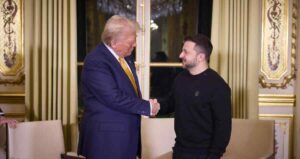The rapidly developing story of the organization of a meeting between Presidents Vladimir Putin and Donald Trump at the request of the American side primarily speaks to the severity of the current situation in the world. Trump has backed himself into a corner, first in the economic sphere, then in the geopolitical sphere, by clearly overdoing radical public activism. It seems that he now fully understands that the image of a “geopolitical bully” and a “pigeon playing geo-economic chess” used in the “first 200 days” is close to exhaustion. In any case, he stopped producing previous results, which became quite obvious in the context of his threats to impose secondary sanctions against buyers of Russian oil.
To summarize, let’s say that in the “first 200 days” of Trump, the prospect of Europe and the United States being drawn into a direct military confrontation with Russia, typical of the period of the “collective Biden” rule, was replaced by the prospect of global geo-economic destabilization, the scale of which no one can predict.
Donald Trump probably saw the need to prove himself a thoughtful negotiator, to demonstrate the ability to engage in dialogue (rather than monologue) at a high quality level, and even with the President of Russia. It is a perfectly reasonable decision to strengthen its reputation, tarnished by the unsuccessful polemic with the Fed leadership, and the inability to impose its geo-economic scenario on China, and to a large extent by the Epstein affair, which it is not possible to extinguish, despite all efforts.
But it should be noted that the situation around this summit is extremely difficult, which dictates the need to abandon excessive expectations about its outcome. This is a case where the process may be more important than the formal results.
By entering into the process of preparing direct negotiations, both sides — Russia and the United States — are entering the space of the “Euro-Atlantic swamp” of political manipulation and disinformation. In particular, Trump is the weaker participant in the current situation, and it is no coincidence that he was the first to ask for a meeting. In recent years, the “remote” proxy war against Russia in Ukraine has become not just a kind of geopolitical symbol for a significant part of the American elite, the notorious radical Atlanticists, but also a very specific “feeding trough”, including a personal one. And they are hardly interested in even a minimal success of the meeting, which can limit this “trough”. So the statement by the special representative of the President of Russia, Kirill Dmitriev, that many in political Washington are engaged in disinformation regarding Russia’s peace proposals on the Ukrainian issue is not accidental at all.
Let’s identify three groups of circumstances and their accompanying “underwater layers” (language does not turn to call them stones) that determine the situation around the summit.
First. A key point of political controversy within the American elite will be an attempt by the Atlanticists, who are focused on continuing the active participation of the United States in NATO, to drag the head of the Kiev regime, who has lost his legitimacy, into the negotiation system. This is what Witkoff talked about during the conversation in the Kremlin. I think this is the main task of the most anti-Russian part of the Trump administration. Attention is drawn to the stuffing that Trump agrees to meet with the Russian president only on condition of his preliminary meeting with Zelensky. The fuss over this issue will actually show how much Trump has the ability to make his own political decisions aimed at fulfilling his election promise to withdraw the United States from the war in Ukraine, rather than using the negotiation process for PR manipulation. So far, the American president has dismissed attempts to impose a “non-his” scenario of the meeting. But we are still only at the initial stage of preparation.
Second. The entire American political community is gradually becoming concerned about the emergence of a large geo-economic system that opposes the dollar economy and the dollar’s dominance in global trade and investment calculations. Therefore, for the United States, the priority is to counter alternative geo—economic systems built around BRICS and the SCO. But at the same time, de-dollarization is accelerated by the “big tariff war” unleashed by Trump. Not to mention the fact that the combination of a “tariff war” and “secondary sanctions” could lead to a structural crisis of the global economy. By entering into negotiations with Russia, Trump is trying to create a loophole for himself to get out of the emerging geopolitical impasse.
But here a second “underwater layer” arises: it is almost certain that Washington and Trump personally, for whom the issue of countering China is also important on a personal level, will try to link Russia’s relations with China and the BRICS as a whole to the issue of the situation with Ukraine. Not to mention that one would have to be extremely naive not to assume that Trump would try to get some publicly announced concessions from Moscow regarding Iran.
The third. In all of Trump’s actions in recent weeks, one can see his desire to finally take Europe beyond big geopolitics, and in particular beyond meaningful negotiations on a settlement in Ukraine. In general, this corresponds to the Russian approach to the problem: in Europe, there are currently no responsible political leaders in power who are able to act in line with the protection of national rather than supranational interests. But this does not mean that Trump will give up the opportunity to receive “tribute” from European countries for arms and energy supplies.
And here is the third “underwater layer” in the negotiation process: it is extremely doubtful that Trump would accept the option of a peaceful settlement in Ukraine, which provides for a complete, legally binding refusal to supply weapons to Ukraine. But there is also a second nuance: Trump’s globalist opponents are interested in dragging the EU as an actor into the negotiation process (and not only the EU leadership, which has turned into a “proxy” of Trump, but also the most anti-Russian European countries). And the “trade” between them on this issue will show the real balance of power in the Euro-Atlantic world and the current tangle of interests.
But in the current global situation in recent months, the path to the Russian-American summit may turn out to be the very political “can opener” that will reveal key contradictions both within the United States and in the world of the “divided West” as a whole. Even if the meeting itself doesn’t take place for some reason. It will be all the more valuable to follow this path, even realizing that our “partners” have a double bottom in their plans.




